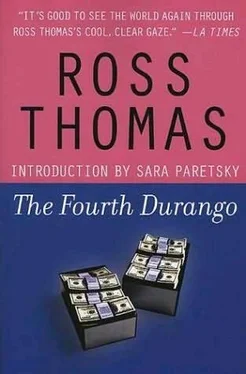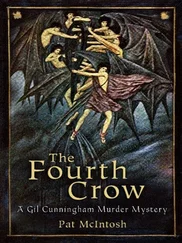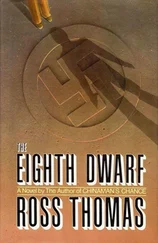Settles, the first policeman to reach Soldier Sloan’s body, watched as the Holiday Inn’s young assistant manager used a key to turn off the elevator so its two doors would stay open and stop nudging the dead man’s waist. Settles knelt beside Sloan, checked for vital signs and looked up at Vines, who, like Adair, was now leaning against the wall opposite the elevators. “He’s dead,” Settles said. “Just like you said.”
Because Vines could think of nothing to add to this, he said nothing. Chief Sid Fork arrived a few minutes later, nodded at Vines and Adair, glanced at the dead Soldier Sloan and began questioning Settles. He was still questioning him when the two homicide specialists, Wade Bryant and Joe Huff, arrived and joined the interrogation of Ivy Settles.
The bald, black and professorial Huff asked an occasional question as he used his Minolta to take photographs of the dead man. When he had taken enough, he interrupted Wade Bryant and said, “Let’s turn him over.”
Once Soldier Sloan lay on his stomach, the saucer-sized bloodstain on the back of his muted plaid jacket was visible. With the help of Bryant, Huff removed the jacket and took some pictures of a bloodstain the size of a dinner plate on the back of Sloan’s pale yellow shirt.
Out of curiosity, Kelly Vines asked, “What d’you guys do for a coroner?”
“Because we’re ninety-two miles from the county seat, they named Dr. Joe Emory assistant deputy coroner,” Huff said, pulling out Sloan’s shirt tails and pushing the shirt itself up toward the dead man’s armpits. “The fancy title doesn’t mean much because the county pays Joe on a piecework basis.”
“He likes doing autopsies?”
“He likes the money,” Huff said.
Once the shirt was up around Sloan’s armpits, the small puncture wound was visible. The wound itself hadn’t really bled much and had the diameter, in Huff’s words, “of a fat ice pick.”
As he rose, Huff added, “He died quick anyway,” and aimed his Minolta at Sloan’s bare back.
“If the angle was right and the guy knew what he was doing,” the still kneeling Wade Bryant said, “then he probably didn’t feel much of anything.”
“He felt it,” Huff said. “He felt it enough to turn around, see who’d done it and keel over backward.”
The assistant hotel manager edged over to Fork. “Couldn’t you guys at least pull him out of the elevator, Sid? We’re going to need it.”
“No, you’re not,” Fork said.
“So when can we start using it?”
“In an hour or two.”
“Well, shit,” said the assistant manager and headed for the stairs. Bryant gave the dead Sloan a final close look and rose. “While we’re waiting for Doc Emory, Chief, I thought maybe Ivy here could tell us some more about his new pal, Francis the Plumber.”
“I already told you,” Settles said.
“We’d like to hear it again,” Bryant said, looking for support to Huff, who was adjusting his Minolta. The black detective looked up just long enough to nod and went back to his camera.
“One more time, Ivy,” the chief of police said.
Settles gave Fork a reproachful look and said, “He was about forty and short and fat-five-one and maybe two hundred and ten. Wore dark blue coveralls with Francis the Plumber across the back in red letters-and a phone number I don’t remember. He carried an old beat-up black toolbox. Had tinted prescription glasses, the kind that go from real light gray to real dark gray depending on the light. Had a gimme cap from Copenhagen snuff. Had a thin nasty mouth. Drove a pink Ford van with a stick-on ‘Francis the Plumber’ magnet sign on one side-maybe both sides, but I don’t know that for a fact. And no, I didn’t get the license number this time either.”
“You forgot his nose,” Huff said, still working on his camera.
“Yeah. Right. The nose. Well, it was kind of squashed up, like I told you, and had this one big nostril and this regular size one and they both looked about a mile deep. They were also hairy. He had a regular forest growing in there and most of it was gray.”
“Tell us again why you let him skip, Ivy,” said Wade Bryant, whose increasingly sly tone matched his too-tall-elf looks.
“I didn’t let him. I showed him my shield and told him to stay put while I went and called Vines here. The guy was a plumber and possibly-just possibly-a solid citizen. What you two guys would’ve done, of course, is make him kiss the floor right off. With all your experience you know for a fact that plumbers are automatic suspects.” Settles paused, glared at Bryant, and added, “Oh, yeah. One more thing.”
“What?” Bryant said.
“I watched Soldier’s elevator all the way up. I mean I watched its numbers light up. It stopped at three on the way up and the other elevator, the one the plumber rode, stopped at three on the way down. So I’d say the plumber got on Soldier’s elevator at three, killed him on the way up to four, got out, took the stairs back down to three and rode the other elevator from there to the lobby, where, for some reason, I neglected to beat the shit out of him.”
After a grateful swallow of the bourbon and water Kelly Vines had handed him, thechief of police looked at Jack Adair and said, “Tell me something. Was Soldier ever a soldier?”
“In two wars,” Adair said, turning from the window in Vines’s room where he had been inspecting the ocean. “And Soldier, incidentally, was his real name.”
“Couldn’t be,” Fork said.
“Years ago I saw his birth certificate. It was back in the early fifties when a certain Mrs. Shipley in the State Department was suspicious of almost anyone who applied for a passport, but particularly suspicious of applicants who’d served in the Lincoln Battalion in Spain and later with the OSS, which is why Soldier’d come to me.”
Fork made no effort to hide his surprise and disbelief. “What the hell was he doing in Spain?”
“Purely by chance Soldier’d landed a job to shepherd nine Dodge ambulances from Detroit down to Mexico and over to Spain. They’d been bought for the Loyalists by some folks who, I think, were later called premature anti-Fascists.” Adair smiled. “Soldier always said his old pal Hemingway helped raise some of the money.”
“How old was Soldier then?”
“When he went to Spain? He’d have been just twenty. He was born April sixth, nineteen seventeen, and I remember the date because it was the day we declared war on Germany.” Adair smiled again, rather gently, and added, “World War One.”
Sid Fork’s impatient nod indicated he knew all about World War One. “And that’s why his folks named him Soldier?”
Adair nodded. “His full name was Soldier P. Sloan. The ‘P’ was for Pershing. A general-in World War One.”
“And he joined up after he got the ambulances over to Spain?”
“So he claimed. Anyway, it was his experience there that got him commissioned a second lieutenant in the OSS just after the war started.” Adair gave Fork another almost apologetic smile. “World War Two.”
“So what’d he do-or claim he did?”
“In the OSS? Engaged in all sorts of hugger-mugger-at least when it didn’t interfere with his black market operations.” This time Adair’s smile was more knowing than apologetic. “Black markets and wars always seem to go hand in hand.”
Fork neatly cut off any further discussion of black markets by asking, “Why’d he want a passport in the fifties?”
“Debts,” Adair said.
“Wanted to skip out on ’em probably.”
“Something like that. So I called in a favor that a certain Republican congressman owed me and Soldier got his passport. When he came back from Europe four years later in ’fifty-five he was thirty-eight years old and suddenly a retired lieutenant colonel. He promoted himself two more times after that, impressing a never-ending series of gullible but wealthy widows who provided him with clothes, cars, cash and whatever remaining charms they had to offer.”
Читать дальше












